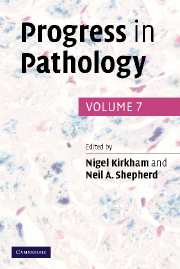Book contents
- Frontmatter
- Contents
- List of Contributors
- Preface
- 1 The microbiological investigation of sudden unexpected death in infancy
- 2 An overview of childhood lymphomas
- 3 Assessment of the brain in the hospital consented autopsy
- 4 The value of immunohistochemistry as a diagnostic aid in gynaecological pathology
- 5 The role of the pathologist in the diagnosis of cardiomyopathy: a personal view
- 6 Metastatic adenocarcinoma of unknown origin
- 7 Immune responses to tumours: current concepts and applications
- 8 Post-mortem imaging – an update
- 9 Understanding the Human Tissue Act 2004
- 10 The Multidisciplinary Team (MDT) meeting and the role of pathology
- 11 Drug induced liver injury
- Index
- References
10 - The Multidisciplinary Team (MDT) meeting and the role of pathology
Published online by Cambridge University Press: 06 January 2010
- Frontmatter
- Contents
- List of Contributors
- Preface
- 1 The microbiological investigation of sudden unexpected death in infancy
- 2 An overview of childhood lymphomas
- 3 Assessment of the brain in the hospital consented autopsy
- 4 The value of immunohistochemistry as a diagnostic aid in gynaecological pathology
- 5 The role of the pathologist in the diagnosis of cardiomyopathy: a personal view
- 6 Metastatic adenocarcinoma of unknown origin
- 7 Immune responses to tumours: current concepts and applications
- 8 Post-mortem imaging – an update
- 9 Understanding the Human Tissue Act 2004
- 10 The Multidisciplinary Team (MDT) meeting and the role of pathology
- 11 Drug induced liver injury
- Index
- References
Summary
INTRODUCTION
National plans for cancer management in England are based currently on regional cancer networks. Within the cancer networks, Tumour Site Specific Groups (TSSGs) have been established for individual cancer sites in the body, and within individual trusts, multidisciplinary teams in a regular multidisciplinary team meeting decide cancer management. This chapter describes the structure and function of the multidisciplinary team meeting in the context of the multidisciplinary team (MDT) and its relationship to the relevant TSSG within the cancer network. There is little peer-reviewed published scientific literature on the effectiveness of this approach, so this chapter focuses on the practical issues of running a multidisciplinary team meeting, based on our personal experiences.
TUMOUR SITE SPECIFIC GROUPS
The purpose of TSSGs is to share good practice and to attempt to achieve consistency in investigation and management of cancer across each region. Each TSSG is comprised of a clinician from each trust in the network, and a clinician from each specialty involved in the investigation and management of cancer at that site within the body, and a primary care physician. A patient representative will also be present, along with a member of each of the professions allied to medicine who are important for that cancer site. The lead clinician for the cancer network and some of the cancer network managers and cancer intelligence gatherers and specialist nurses will be present also.
Meetings of the TSSG are chaired by a chairman elected from the group for a three-year term of office.
- Type
- Chapter
- Information
- Progress in Pathology , pp. 235 - 246Publisher: Cambridge University PressPrint publication year: 2007
References
- 1
- Cited by



